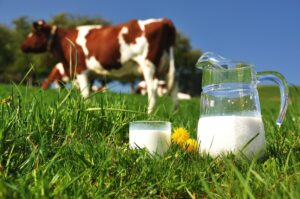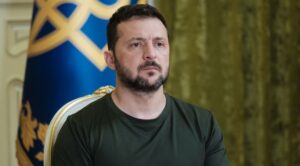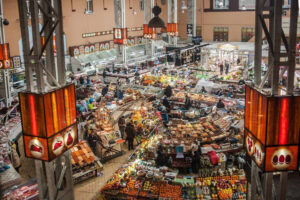
The number of Ukrainians planning Christmas and New Year shopping has increased over the year from 65% to 75%, despite the fourth year of full-scale war, according to Deloitte Ukraine’s “Holiday Shopping 2025” survey, provided by the company’s press service.
“This year, we see that preparations for the holidays are becoming more thoughtful and forward-looking: Ukrainians are planning their purchases earlier, approaching spending more cautiously, and more often choosing things that have personal significance for them and their loved ones. For 51% of respondents, the process of preparing gifts remains a pleasant ritual rather than a source of stress. Such familiar concerns help us today to support ourselves and those around us,” notes Alexander Yampolsky, head of retail and wholesale distribution at Deloitte Ukraine.
However, according to the survey results, more and more Ukrainians are also choosing to celebrate at home—68% compared to 54% in 2024. More and more Ukrainians are starting their holiday shopping early: 18% before December, while the main shopping period is December 1-24 (62%).
For the fourth year in a row, Ukrainians are not increasing their spending: 46% are willing to spend no more than a quarter of their monthly income on shopping, and 54% plan to spend between UAH 1,000 and UAH 5,000, with holiday purchases focused on family (88%) and friends (40%). At the same time, young people are more likely to deviate from the traditional scenario: 49% buy gifts for themselves.
Ukrainians most often do their holiday shopping in large and medium-sized supermarket chains (43%), with online stores consistently ranking second (27%) and cosmetics stores (21%) remaining popular due to the demand for gifts “for themselves and their loved ones.”
The most popular tools for choosing gifts are wish lists (46%), price comparison services (54%), and online reviews (50%). Recommendations from influencers play a much smaller role, with only 9-10% of respondents relying on them. And only 10% of respondents believe that the presence of an AI assistant on retailers’ online platforms would make it easier to select holiday gifts.
It is emphasized that shoppers are most upset by the lack of available products (27%), excessive advertising (22%), and inconvenient search filters (14%).
At the same time, 64% of Ukrainians plan to allocate part of their holiday budget to charity, and 8 out of 10 primarily support Ukrainian defenders on the front lines.
“The holiday habits of Ukrainians reflect not only consumer trends, but also deeper internal changes. The way people give gifts, celebrate, and seek joy is now an important part of their emotional stability. Even during the war, Ukrainians remain a community that helps, shares, and creates a festive atmosphere for each other,” Yampolsky concluded.
The study was conducted using a multi-stage stratified sample representing the population of Ukraine by gender, age, size of settlement, and type of employment. Data was collected through an online survey using a quota sample that corresponds to the socio-demographic profile of the Ukrainian population. In total, more than 1,000 respondents took part in the survey.

Industrial dairy farming in Ukraine continued to recover in 2025, with the number of cows on farms and individual enterprises increasing by 2.3% and raw milk production increasing by 7.6% over 10 months, according to the Ukrainian Dairy Industry Association (UDIA).
“This year, dairy farms will produce 0.2 million tons of milk more than in 2024, and milk supplies for processing will exceed 3.6 million tons (compared to 3.2 million tons last year). These results were made possible by favorable prices in 2023-2024, which stimulated active investment in the construction and expansion of farms,” the business association noted.
The SMPU noted that the situation worsened in the fall due to a sharp drop in world prices: butter in the EU fell in price by more than 30%, cheese by almost a quarter, and the price of dry milk fell significantly. This led to a decline in purchase prices for raw milk worldwide: FrieslandCampina has lowered them by almost 25% since August; prices have fallen in the US, New Zealand, and Mercosur countries. Since November, the decline has also significantly affected Ukraine, and it will continue in winter.
Globally, the low cost of raw materials could lead to bankruptcies among small farms, especially in the EU. Ukraine has a certain advantage in this situation, as it follows the “American model” with large dairy farms (averaging 300+ cows), modern technologies, its own feed base, and lower credit burdens.
“After the end of the price crisis, which is estimated to last until spring 2026, the global supply of milk will decline and prices will begin to recover. This will create new opportunities for the entire Ukrainian dairy sector, both milk suppliers and processors,” emphasized the association of dairy producers.
The SMPU called on milk suppliers to work together to develop long-term contracts.

Ukrainian President Volodymyr Zelensky said that he is asking the US and Europe to ensure security for the elections, after which Ukraine will be ready to hold them in the next 60-90 days.
“Not only that, I am now asking, and I am stating this openly, for the US to help me, possibly together with European colleagues, to ensure security for the elections. Then, in the next 60-90 days, Ukraine will be ready to hold elections. I personally have the will and readiness to do so,” Zelensky told reporters on Tuesday.
At the same time, the president noted that the issue of elections in Ukraine depends primarily on Ukrainians, not on the people of other countries.
He stressed that he is ready for the elections, but explained that security and a legislative basis for their legitimacy are necessary for the elections to be held.
“Further, since this is how things have turned out, I ask that the deputies of our faction, in principle, our parliamentarians, prepare legislative proposals on the possibility of changing the legislative framework and the law on elections during martial law,” Zelensky added.
According to him, he is waiting for proposals from partners and deputies and is ready to go to the polls.

The price of silver on the spot market went up 3% during trading on Tuesday, hitting $60.24 per ounce, which is a new all-time high.
Gold rose 0.4% to $4,235.9 per ounce.
The rise in the cost of precious metals is driven by expectations that the Federal Reserve will cut its benchmark interest rate by 25 basis points following its next meeting on Wednesday. Based on futures quotes for the rate, traders estimate the probability of this at 89.6%, according to CME FedWatch.
If the forecast comes true, the rate will be reduced for the third consecutive meeting.
“Another 25 basis point rate cut is expected, which is generally optimistic for gold. The market remains strong and could reach record prices after the Fed’s announcement,” said Bob Haberkorn, senior market strategist at RJO Futures.
Currently, it takes 71 ounces of silver to buy 1 ounce of gold, compared to 82 ounces in October.
“The silver-to-gold price ratio is 70 times closer to the average for the last couple of decades, but historically we have gone as low as 40. So, there is definitely potential for growth,“ said Maria Smirnova, director of investments at Sprott Asset Management. ”If we don’t eliminate the deficit, silver has only one way to go — up.”

Representatives of the initiative group of regional federations announced a systemic crisis in the Ukrainian Boxing Federation and called for transparency and compliance with statutory norms ahead of the FBU conference scheduled for December 12.
The head of the FBU Control and Audit Commission, Konstantin Kalashnikov, announced that an initiative group had been formed from legally registered and actively operating regional branches, with about 15 organizations joining.
“The Ukrainian Boxing Federation is in a systemic crisis, so we have formed an initiative group of actively operating regional organizations. Our task is to restore the right to vote to the real federations and prevent decisions from being made behind closed doors or replaced by ‘paper’ branches; We will defend this right at the conference on December 12,” said Konstantin Kalashnikov, chairman of the FBU’s control and audit commission, at a press conference at the Interfax-Ukraine agency on Tuesday.
Kalashnikov also stated that the initiative group sees signs of a “raider takeover” and a violation of the principles of sports democracy in the actions of the current leadership. He separately drew attention to the risks to the international reputation of Ukrainian boxing due to cooperation with the IBA contrary to the position of the International Olympic Committee, and also announced the group’s intention to defend the position of the regions at the FBU conference.
In turn, FBU Vice President Andriy Kotelnyk noted that part of the boxing community does not support the split within the federation, but considers it unacceptable to ignore the IOC’s recommendations to distance itself from the IBA.
“The Ukrainian Boxing Association was created by an initiative group of five federations not to split or divide Ukrainian boxing, but to keep it in the Olympic Games. We supported the course of joining World Boxing, as recommended by the IOC, and want Ukrainian boxing to develop as a public, not a privatized structure,” said FBU Andriy Kotelnyk.
Kotelnyk also said that the initiative group had prepared a draft of the updated charter, which, according to them, preserves the role of regional centers, as well as a program for the development of Olympic boxing for the 2026–2028 and 2029–2032 cycles. He added that a number of companies have expressed their willingness to support the FBU, contributing approximately 25 million per year to the needs of Olympic boxing.
FBU presidential candidate and president of the Sumy Regional Boxing Federation Mykola Kravchenko presented his vision for reforms and a development program. Among his priorities, he named the institutional unification of the federation, fair and transparent elections of governing bodies, mechanisms for independent control, as well as financial motivation for athletes, coaches, and judges. He also supported the development of the National Boxing League and the project of a club championship based on the model of clubs symbolically associated with the structures of the Armed Forces of Ukraine.
“Ukrainian boxing has always been based on character, discipline, and tradition, but today it is time to move forward more boldly and in a more orderly manner. I propose institutional unification of the federation and transparent management without division into ‘us’ and ‘them’, fair and transparent elections of governing bodies, mechanisms for independent control and clear financial motivation for athletes, coaches and judges,” Mykola Kravchenko emphasized.
The president of the Kyiv City Boxing Federation, Oleksandr Negoda, gave examples of the work of the capital’s center and critically assessed the interaction with the leadership of the FBU. In particular, he reported that in 2025, three new halls were opened in Kyiv, one of which is in the Kyiv Sports Lyceum, and the closed city championship among youth and juniors attracted 428 participants, compared to the previous record of 170. At the same time, according to him, the Kyiv Federation’s request to include the Kyiv Cup tournament in the FBU calendar remained unanswered.
“We hold high-level capital championships and pay cash prizes to motivate our boxers, but the FBU completely ignores our appeals, in particular regarding the Kyiv Cup tournament. At the same time, at the last Ukrainian Cup, the prize was a certificate for 400 hryvnia—the Ukrainian Cup champion receives 400 hryvnia. How do you like that motivation?” asked the president of the Kyiv City Boxing Federation.
Negoda also drew attention to what he called “manipulation” with regional representation and referred to data from relevant agencies on the number of active regional federations within the FBU. He stated that some of the branches, which, according to him, are not active in all-Ukrainian competitions, retain the right to vote, while a number of federations with results at the national and international levels, in the opinion of the official, are deprived of this right.

Approximately $3.5 million has been invested in the modernization of the Bessarabsky Market in the capital and the launch of the “Bessarabka. Food Market” project, according to project manager Natalia Dzhuylay.
“The estimated investment in the modernization is about UAH 150 million (approximately $3.5 million at the exchange rate at the time of calculation). More than half of this amount was raised in the form of a loan, the rest — from the project participants’ own funds,” she told the media outlet “Reve ta stogne restaurator” (The Restorer Roars and Moans).
She noted that this project is changing the essence and purpose of the Bessarabsky Market: traders who have worked here for decades are returning to their places and continuing to work in the renovated, but essentially unchanged, shopping arcades.
According to her, the main principle of the food hall concept is that there should be no duplication of formats and menus, and each corner should occupy a unique niche. Contracts with residents are concluded for one year.
“In case of failure to meet the specified financial indicators, we reserve the right to replace the corner. But it is obvious that failure to meet KPIs is primarily unprofitable for the resident itself, as it means a lack of sufficient revenue and traffic. We are interested in each corner working effectively, so in case of a decline, we will analyze the reasons and look for ways to improve,” Dzhuay said.
The project’s Instagram page does not have an opening date, only an announcement that it will happen soon.
“Launching a project requires extensive preparation, coordination, and investment. We had to gather residents, set up retail spaces, and get ready. Some of the work had to be postponed. Ideally, the opening should have taken place in September, but it is more important for us to do everything well, rather than in a hurry. We are not afraid of the winter period — on the contrary, we want traders and restaurateurs to be able to work right now,” she said.
As previously reported by Village, as part of the gastronomic project “Bessarabka. Food Market,” 17 food corners and a separate bar are planned to open at the Bessarabsky Market, with a total of about 400 seats in various formats. Participation in the project “Bessarabka. Food Market” project include Ministry of Desserts, Himalaya, Buffalino, Burger Farm, Glek, Matsoni, Big Mama, Zharovnya, Tatarka, Sushi Icons, Gyros, Gelarty, Vytch, as well as the Cherry Coffee café and bar.
The Bessarabsky Market is one of the oldest covered markets in Ukraine, built at the beginning of the 20th century according to a design by architect Henrik Gay. Its building is a monument of architecture and urban planning of national importance.
Prior to this, in the summer of 2024, renovation work began on the Bessarabsky Market. The Kyiv City State Administration noted at the time that the post-Soviet superstructures were being removed from part of the premises, and the work did not involve any interference with the historical details of the structures. Since May 2025, the market’s refrigeration equipment has been upgraded to reduce energy consumption.